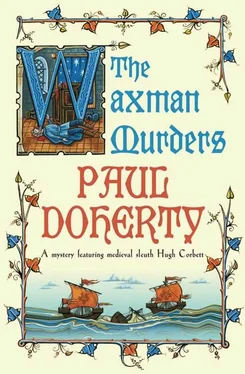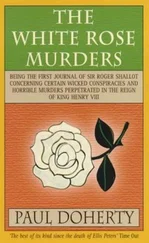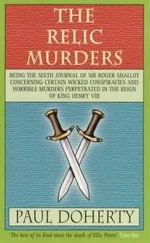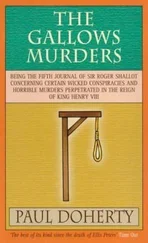Paul Doherty - The Waxman Murders
Здесь есть возможность читать онлайн «Paul Doherty - The Waxman Murders» весь текст электронной книги совершенно бесплатно (целиком полную версию без сокращений). В некоторых случаях можно слушать аудио, скачать через торрент в формате fb2 и присутствует краткое содержание. Год выпуска: 0101, Жанр: Исторический детектив, на английском языке. Описание произведения, (предисловие) а так же отзывы посетителей доступны на портале библиотеки ЛибКат.
- Название:The Waxman Murders
- Автор:
- Жанр:
- Год:0101
- ISBN:нет данных
- Рейтинг книги:3 / 5. Голосов: 1
-
Избранное:Добавить в избранное
- Отзывы:
-
Ваша оценка:
- 60
- 1
- 2
- 3
- 4
- 5
The Waxman Murders: краткое содержание, описание и аннотация
Предлагаем к чтению аннотацию, описание, краткое содержание или предисловие (зависит от того, что написал сам автор книги «The Waxman Murders»). Если вы не нашли необходимую информацию о книге — напишите в комментариях, мы постараемся отыскать её.
The Waxman Murders — читать онлайн бесплатно полную книгу (весь текст) целиком
Ниже представлен текст книги, разбитый по страницам. Система сохранения места последней прочитанной страницы, позволяет с удобством читать онлайн бесплатно книгу «The Waxman Murders», без необходимости каждый раз заново искать на чём Вы остановились. Поставьте закладку, и сможете в любой момент перейти на страницу, на которой закончили чтение.
Интервал:
Закладка:
Corbett opened the leather bag fastened to his saddle horn and drew out a small purse of clinking coins. He edged his horse forward, dropped the pouch into the man’s outstretched hand and stared down at eyes full of laughter.
‘Why do you call yourself the Merchant of Souls?’
‘Because, Sir Hugh, I promise those who care for us, as any good merchant vouches, that I will sell their souls to God.’ He held up the purse. ‘I thank you for this. These,’ he gestured to his companions standing slightly behind him, ‘are Christ’s poor. Fill their bellies, Sir Hugh, and you fill Christ’s treasury. For if you give a cup of water to one of these, then you have given it to Him.’
‘And Griskin?’ Corbett asked. ‘You said you had a message for me.’
‘I knew Griskin,’ the Merchant of Souls replied. ‘I met him.’
‘You met him.’ Corbett closed his eyes and smiled. ‘Of course,’ he whispered.
‘Griskin’s parents were lepers,’ the Merchant of Souls continued. ‘He looked after them and suffered no ill effects, no contagion. He was not frightened of us.’
Corbett nodded. He had forgotten about his former comrade’s complete lack of fear of other lepers.
‘That is how he travelled the countryside,’ the Merchant of Souls went on. ‘Who would approach a leper? We stand outside city gates, we beg for alms. Our ears may be rotting, but we hear about this person or that. I can tell you all about Canterbury, Sir Hugh. How Lady Adelicia Decontet is held in the dungeons in the Guildhall accused of murdering her husband, as well as that other great abomination perpetrated at Maubisson Manor. You see, Sir Hugh, all things come to us. People think we do not exist. We are like the trees, something they pass and ignore, yet we stand and listen. Master Griskin travelled the countryside. He visited our brothers in Suffolk, its towns and villages, and then he came back to Canterbury. At times he played the boisterous clerk, but when he wanted to, he assumed the garb of the leper.’ The Merchant of Souls tapped the yellow star sewn on his left shoulder. ‘Then he would come here. He was a good man, Sir Hugh.’ The Merchant of Souls grasped the reins of Corbett’s horse.
‘And what did he say?’ Corbett asked.
‘He believed he had found the truth about some matter from a hermitage near Orwell.’ The leper looked down at the trackway. ‘Ah yes, he said he was going to meet his good friend, though he never gave your name, Sir Hugh. I learnt that later. He said the secret was bound up with the hermitage and its chapel, St Simon of the Rocks, and that’s all he would say.’
‘And then what happened?’ Corbett asked.
‘He left us. He said he was going back to Suffolk. Why, Sir Hugh? Will he return?’
‘No,’ Corbett replied. ‘Brother Griskin is dead.’
The Merchant of Souls hastily crossed himself. ‘Then God assoil him,’ he whispered. ‘How, Sir Hugh, an accident?’
‘Murder!’ Corbett replied. ‘But I am God’s vengeance.’ He leaned down and patted the leper on the shoulder. ‘I promise you that, Merchant of Souls. Remember me in your prayers, and here.’ He opened the leather bag again and pressed another small purse into the man’s hand. ‘Give that to Christ’s Treasury.’
He was about to turn his horse when the leper spoke.
‘Sir Hugh, have you forgotten something?’ Corbett soothed his horse. ‘What, sir? What have I forgotten?’
‘Brother Griskin was searching for a man called Hubert the Monk, a man who hunted down outlaws, half-brother to the pirate Blackstock.’
‘Do you know of him?’ Corbett asked. ‘Indeed, how do I know you are not he?’
The Merchant of Souls laughed, a merry sound. ‘Trust me, Sir Hugh, I am not Hubert the Monk. Griskin talked about him and said he was a man of great deceit and subtle wit. They say he, too, was one of the few men not frightened by the likes of us.’
‘Have any of your brothers ever met him?’ Corbett asked.
‘Many, many years ago. One of our brothers, now deceased, went to the cloister school with him; Magister Fulbert taught them both. That is all. But as I said, we stand by gateways and porchways; we listen to the chatter of everyone. You are hunting him, aren’t you, Sir Hugh? I wish you well. God’s grace go with you, for I have told you all I can.’
Corbett thanked him and rejoined Ranulf, and they made their way back up towards Queningate. They passed through that yawning arched entrance into the city and Ranulf stared around. He’d been to Canterbury with Corbett once before, but that had been through the outskirts, not the city itself. This was a stark contrast to the silent countryside. Despite the snow and ice, the place was busy as an upturned beehive. The broad pathways and lanes were packed with people, a sea of surging colour as the crowds moved to and from the markets. Corbett and Ranulf had no choice but to dismount and lead their horses, forcing their way through, following the old city wall down beneath the glorious massy-stoned cathedral and on to Burgate Street, which cut through the centre of Canterbury.
On either side of this main thoroughfare rose the beautiful mansions and stately homes of the merchants and burgesses of the city. These were sumptuous houses of pink and white plaster and black beams, each storey jutting out above the other and resting on a solid stone base. The doorways and gables of these mansions, carved, gilded and painted, overlooked the cacophony of sound along Burgate as pantlers, grooms, buttery boys and other servants bustled out to buy provisions for their masters. Herb wives and milkmaids were eagerly selling their produce. Apprentice boys scampered up to attract their attention by plucking at their sleeves before retreating back behind the broad stalls, erected against the front of houses under their billowing striped awnings. The poor clamoured for alms as the rich, with sparkling eyes, red lips and lily-white skin, processed by in their satins and samites, heads covered in short hoods with the liripipes wrapped around their necks, their shoulders mantled in wool, their waists girdled with belts studded with silver and gold. Dirt-smattered blacksmiths in bull’s-hide aprons stood outside their smithies shouting for custom, whilst beside them water boiled in buckets from the red-hot irons thrust there. Merchants’ wives in costly robes furred with ermine, multicoloured and lined with soft vair, surveyed the stalls and made their purchases. A jester offering to do a somersault wandered amongst them, his head, completely shaven, covered in glue and decorated with duck feathers. An old woman with a tray shrieked how she had night herbs which would cure all ailments. Beside her a chanteur, a professional story-teller, explained how in Ephesus the Seven Sleepers had turned on to their left side, a gloomy sign of how the times were growing more perilous. Carters tried to force their way through, whilst more enterprising citizens pulled sledges full of produce. Dogs yipped and yelped; a piglet, specially greased, had been released by a group of children and ran loose across the thoroughfare, pursued by a legion of its young tormentors.
They passed the main entrance to the cathedral. Ranulf wished to go in but Corbett replied that they would visit it later. They continued on their way up into the great courtyard of the Guildhall, a three-storey building, wattle-daubed and timbered on a honey-coloured stone base. Servants ran up to demand their business, but as soon as they saw Corbett’s warrant they immediately became obsequious, offering to take his horses. Once Ranulf had dealt with this, they entered the Guildhall, turning right into the main chamber, a long, draughty room, its doorways and windows protected by heavy cloths.
For a while they just sat on a bench whilst a common serjeant loudly listed the goods of some dead citizen: ‘three canvas cloths, twelve barrels, two tubs, four bottles, six leather pots. .’ Corbett listened to the man’s sonorous voice rise and fall. He could have stood upon his authority, showed his seal, demanded immediate access to the Mayor, but he wanted to collect his thoughts, and looking at Ranulf, he believed his companion felt the same. At last the cold began to seep out of his fingers and he relaxed in the glow of warmth from the braziers, piled high with charcoal, which spluttered and sparkled in every corner. He was about to rise to his feet when an usher suddenly burst through the door and gestured frantically at them.
Читать дальшеИнтервал:
Закладка:
Похожие книги на «The Waxman Murders»
Представляем Вашему вниманию похожие книги на «The Waxman Murders» списком для выбора. Мы отобрали схожую по названию и смыслу литературу в надежде предоставить читателям больше вариантов отыскать новые, интересные, ещё непрочитанные произведения.
Обсуждение, отзывы о книге «The Waxman Murders» и просто собственные мнения читателей. Оставьте ваши комментарии, напишите, что Вы думаете о произведении, его смысле или главных героях. Укажите что конкретно понравилось, а что нет, и почему Вы так считаете.












